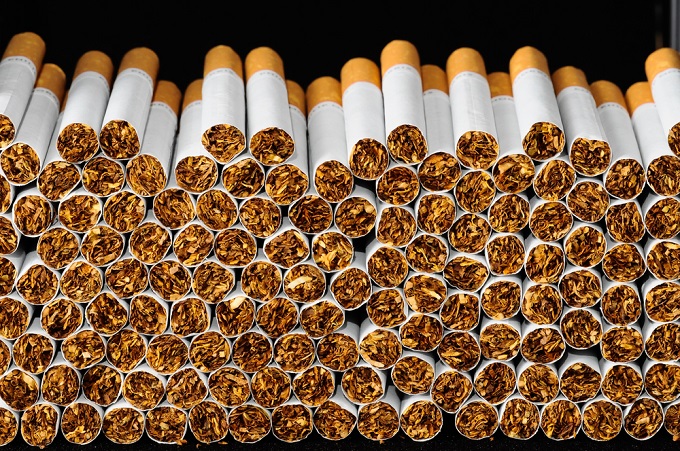ISLAMABAD: In the wake of a significant increase in excise rates that has led to a surge in the availability of smuggled and illicit cigarettes in the market, the legitimate tobacco industry has begun shutting down operations.
The Pakistan Tobacco Company (PTC), a leading multinational tobacco firm, has sent a letter to the Federal Board of Revenue (FBR) stating its intention to re-export four manufacturing machines from its units due to a decline in sales volume.
During a media briefing held on Saturday, PTC representatives disclosed that there has been a drastic decline in the sales of the legitimate tobacco industry, while witnessing a sharp rise in the sale of illicit cigarettes. The substantial increase in excise rates in February 2023 coupled with inadequate enforcement measures, has resulted in the proliferation of illicit cigarettes, including Duty Not Paid (DNP) and smuggled variants.
According to recent data from the Pakistan Bureau of Statistics (PBS), the legitimate tobacco industry witnessed a 50% decline in production volumes in March, which marked the first month of sales after the exponential excise increase in February. Furthermore, the overall decline in Large-Scale Manufacturing (LSM) was 25%, half of the decline experienced by the tobacco industry. This negative impact has persisted throughout the year, with the legitimate tobacco industry suffering a production loss of 24% from June 2022 to March 2023, three times higher than the decline observed in the LSM sector.
Consequently, consumers have resorted to purchasing cheaper alternatives, including locally manufactured DNP cigarettes and undocumented smuggled cigarettes, resulting in a down-trading trend. Since January 2023, the volumes of DNP and smuggled cigarettes have surged by 32.5% and 67%, respectively. Consequently, the illicit sector now constitutes more than 42.5% of the total market.
In the 2022-23 period, the legitimate tobacco sector accounted for 41.4 billion cigarettes, while the illicit sector’s share stood at 41.6 billion cigarettes. However, due to the recent hike in the Federal Excise Duty (FED) imposed on the tobacco industry, projections indicate that the legitimate tobacco sector’s share will decline to 29.6 billion cigarettes in 2023-24, while illicit cigarettes’ share will reach 53.4 billion cigarettes. This implies a shift of 11.8 billion cigarettes to the illicit sector.
Refuting claims were made by certain non-governmental organizations (NGOs) suggesting that the illicit cigarette industry’s share is only 9-18%. However, PTC officials dismissed these figures as irrelevant and unsupported by any credible market research.
Qasim Tariq, Senior Business Development Manager, expressed concern that due to the over 200% increase in excise rates in February 2023, the tax losses caused by the illicit sector during the fiscal year will exceed the legitimate industry’s contribution to the national exchequer for the first time in the country’s history.
“If the current fiscal policies persist, both the national exchequer and the legitimate industry will face immense damage, necessitating difficult decisions,” he added.
The implementation of a Track & Trace system in the tobacco industry was a key initiative to curb illicit trade. However, despite multiple directives from the Prime Minister to implement Track & Trace nationwide, it remains a distant dream. Local manufacturers continue to disregard the country’s rules and regulations with impunity.
This situation is further aggravated by advertising and promotional campaigns carried out by illicit manufacturers, which offer cash prizes, giveaways, and merchandise to consumers, activities that are prohibited. An aggressive and effective enforcement campaign is urgently needed to combat this menace.
Tariq revealed that the company has informed the Federal Board of Revenue (FBR) about its consideration of re-exporting four manufacturing machines from its units due to the decline in sales volume in the legitimate industry.
According to him, fiscal interventions and stringent enforcement measures must go hand-in-hand to control the expansion of the illicit sector. Based on current industry standards, if the prevailing conditions persist, the illicit sector is expected to double in size compared to the legitimate sector within the next year. This will result in irreparable losses for both the legitimate industry and the country, including job losses and reduced investments, exacerbating the already severe financial constraints faced by the nation.





I have made several unfortunate decisions based on the lifestyle I choose. I took several debts to gamble with, and when I got the chance to make instant money with little risk and lots of profits. I jumped into it, I thought I would pay off all my debts and still have plenty. I wasn’t stupid, I was just too greedy to see that I was being scammed that I kept investing hundreds of thousands in these crypto racketeers. Writing this review is the only good thing I have done in my life for years as I will be saving tons of people from falling prey to these Bitcoin investment racketeers. I got in touch with this programmer online, I was very open and honest with him, I just wanted to know if they can really help me retrieve my hijacked funds before dragging myself into another mess. He was very honest, and dealing with this programmer was enlightening. We achieved success together as he always says. My hijacked tokens were successfully traced and retrieved. “Cybergenie ( @ ) cyberservices . com–WA (+) 1)2525120391”. You can never go wrong with CYBER GENIE..